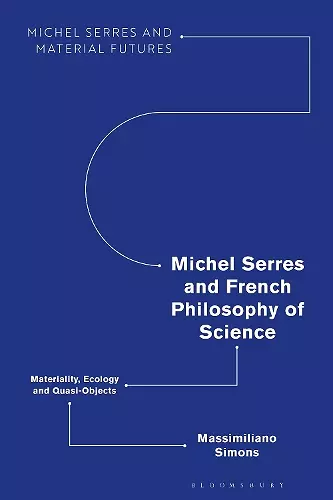Michel Serres and French Philosophy of Science
Materiality, Ecology and Quasi-Objects
Format:Hardback
Publisher:Bloomsbury Publishing PLC
Published:21st Apr '22
Currently unavailable, and unfortunately no date known when it will be back

A systematic study and application of Serres' philosophy of science within the context of late 20th-century French epistemology.
Massimiliano Simons provides the first systematic study of Serres’s work in the context of 20th-century French philosophy of science. By proposing new readings of Serres’s philosophy, Simons creates a synthesis between his predecessors, Gaston Bachelard, Georges Canguilhem and Louis Althusser as well as contemporary Francophone philosophers of science such as Bruno Latour and Isabelle Stengers.
Simons situates Serres’s unique contribution through his notion of the quasi-object, a concept, he argues, organizes great parts of Serres’s work into a promising philosophy of science as well as a challenge to the narrower field of French epistemology, to which it has often been limited. Simons highlights how the concept encompasses Serres’s commitment to positive relations between science and culture and his rejection of pleas to purify the scientific self from imaginative and cultural elements. It helps to situate Serres between the distinct traditions of Bachelard and Latour as well as progressing the innovative aspects of Serres’s philosophy for current debates in the philosophy, history and sociology of science.
Showing how Serres’s philosophy can serve as a normative approach to science and technology, Michel Serres and French Philosophy of Science takes in themes of materiality, religiosity, modernity and ecology to advance a timely alternative to philosophy of science for contemporary life.
Of the great French philosophical intellectuals from the second half of the twentieth century, Michel Serres is the one who least stood in the limelight of academic and public attention during his lifetime. And yet, he probably will be the one with the most lasting impact. Massimiliano Simons has written a book on this extraordinary thinker that lets us understand why this is so. Serres combines a deep understanding of the ambiguities – and the options – of the modern sciences and technologies with an equally deep commitment toward what matters for our endangered planet. Here is a brilliant book that makes us understand the tremendous potential of this herald of the Anthropocene avant la lettre * Hans-Jörg Rheinberger, Director emeritus, Max Planck Institute for the History of Science, Germany *
Looking at the reception of his work, there is still an air of mystery surrounding the name of Michel Serres. Serres is both well-known and unknown; at the same time rated as an important thinker, and underrated, in that his place within recent French philosophy remains little understood. In fact, the real significance of his work may be counted among the best kept secrets of French thought. At least, that seems a fair appraisal until now, that is - until Massimiliano Simons's monograph is appearing here and now. Simons manages to develop the fundamental aspects of Serres's thought in the appropriate degree of detail without sacrificing any of the clarity that may be desired. Moreover, and of crucial importance, Simons succeeds in giving us the link that was missing in order to grasp what remained evasive about Serres's role and place: forgetting about the cliches, Simons elaborates the complex network of relations linking Serres to the whole set of authors determining the field of French philosophy, especially in so far as the latter may be linked to what has often been termed 'French epistemology'. In particular, the intricate and as of yet ill-understood relations and interactions between Serres's work and such thinkers as Bachelard, Foucault, Dagognet, Althusser, Lyotard, Dumézil, Lyotard, Girard, Dupuy, and Gauchet, and a few others, are presented in an enlightening, even revealing way. In as much as a real understanding of Michel Serres has until now remained a lacuna in philosophy, the appearance of this book may be said to constitute an intellectual event. * Paul Cortois, Emeritus Professor of Philosophy, KU Leuven, Belgium *
This book is a real eye-opener. It brings Michel Serres into dialogue with the tradition of Historical Epistemology (Bachelard, Canguilhem, etc.) and contemporary thought (e.g., Latour, Stengers). Against this background, we clearly recognize the breathtaking topicality of Serres' work. It consists in translating the ecological crisis of the Anthropocene into an entirely new philosophy.
* Henning Schmidgen, Professor of Media Studies, Bauhaus-Universität Weimar, Germany *ISBN: 9781350247864
Dimensions: unknown
Weight: unknown
256 pages